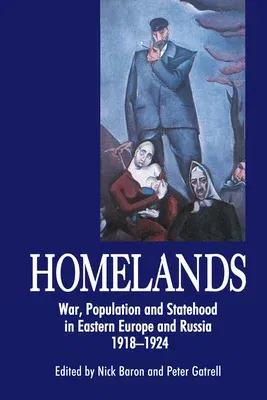Homelands: War, Population and Statehood in Eastern Europe and Russia, 1918-1924 (First Edition, First)Hardcover - First Edition, First, 10 August 2004

Temporarily out of stock
Free Delivery
Cash on Delivery
15 Days
Free Returns
Secure Checkout

Part of Series
Anthem Russian, East European and Eurasian Studies, Anthem European Studies
Part of Series
Anthem Slavic and Russian Studies
Part of Series
Anthem Studies in Population Displacement and Political Space
Part of Series
Anthem Russian and Slavonic Studies
Part of Series
Anthem World History
Part of Series
Anthem Series on Russian, East European and Eurasian Studies
Part of Series
Anthem European Studies
Part of Series
Anthem Studies in European Ideas and Identities
Part of Series
Anthem Studies in Peace, Conflict and Development
Part of Series
Anthem Russian, East European and Eurasian Studies
Print Length
257 pages
Language
English
Publisher
Anthem Press
Date Published
10 Aug 2004
ISBN-10
1843311208
ISBN-13
9781843311201
Description
Product Details
Book Edition:
First Edition, First
Book Format:
Hardcover
Country of Origin:
US
Date Published:
10 August 2004
Dimensions:
24.33 x
15.8 x
2.31 cm
ISBN-10:
1843311208
ISBN-13:
9781843311201
Language:
English
Location:
London
Pages:
257
Publisher:
Series:
Anthem Russian, East European and Eurasian Studies, Anthem European StudiesAnthem Slavic and Russian StudiesAnthem Studies in Population Displacement and Political SpaceAnthem Russian and Slavonic StudiesAnthem World HistoryAnthem Series on Russian, East European and Eurasian StudiesAnthem European StudiesAnthem Studies in European Ideas and IdentitiesAnthem Studies in Peace, Conflict and DevelopmentAnthem Russian, East European and Eurasian Studies
Weight:
653.17 gm